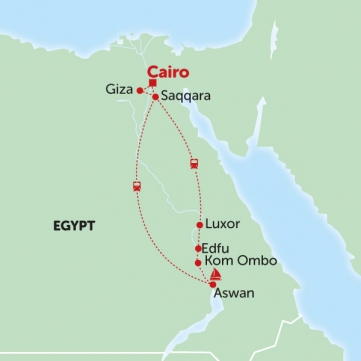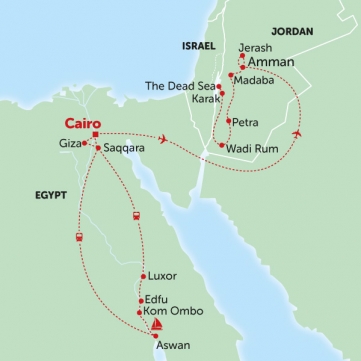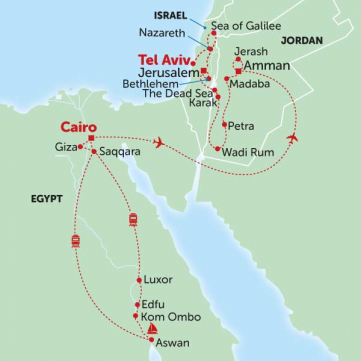Book NOW for $1 £1 €1 • Flexible Payments • No Change Fees • Private Departures Available
- Home >>
- Food and drink in Egypt
Food in Egypt
Egypt has been a tourist destination for thousands of years, and visiting cultures have each left a little something behind in the flavours on offer today. Food lovers will be able to recognise Greek, Syrian, Turkish, and Lebanese influences in many dishes. The 1900’s brought foods from India and beyond to add to the mix.
For meat lovers there is shawarma, often served with tahini or garlic sauce. Feseekh, dried salted fish is a staple, though some say it is an acquired taste. With spices, herbs and delicious breads, Egypt is the destination for foodies and caters for people who like to eat what they know and the curious alike.
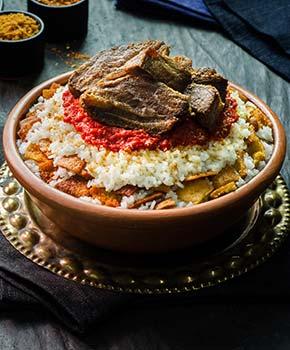
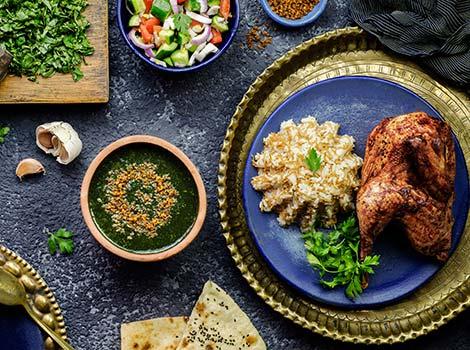
What Food in Egypt should I try?
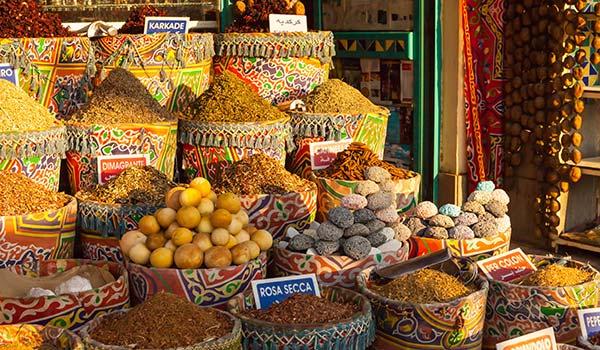
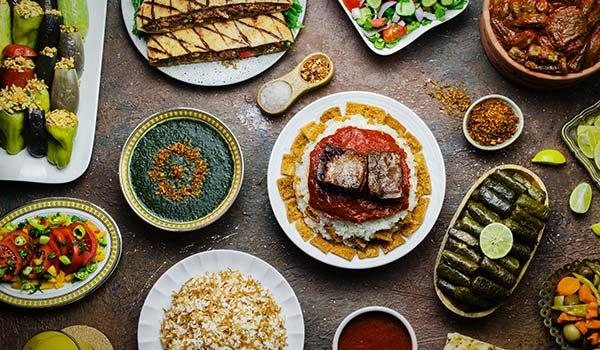
Koshari
This aromatic dish is considered the national dish of Egypt though it is thought to have originated in the 19th century, brought to Egypt by travellers from India.
Whilst everyone will have their own slightly different recipe, it is typically made from rice, macaroni and lentils mixed together and dressed with chickpeas and fried onions. This mix is then flavoured to your own taste with a spiced tomato sauce and garlic vinegar.
The tomato sauce is made using a blend of middle eastern spices known as baharat which contains cumin, coriander, cardamon and paprika.
Whilst it may sound a strange combination, wait till you taste it!
Originally a dish prepared at home and taken to work by workers, this tasty dish has been a favourite with locals and tourists alike for many years. Some restaurants specialise in Koshari, perfecting their own unique flavour and serving nothing else.
Did you know?
The ancient Egyptians were big fans of bread, often served as the main part of a meal. When the bread turned mouldy, they used it to fight off infections.
Ful medames
A staple food across Egypt, ful medames, or fūl, is a vegetarian stew flavoured with cumin, and optionally with chopped parsley, garlic, onion, lemon juice, chili pepper.
Typically made with different fava beans, the dish is common across Africa and the Middle East where it is commonly eaten for breakfast, but also to break the fast during Ramadan. It is usually eaten with flatbread and served with a boiled egg.
In the middle ages bath attendants stoked heated huge pots of bath water for the public baths. At the end of the day, when the baths closed, the embers remain hot and local businesses would take advantage of the heat to dry their fava beans. Restaurants acros Cairo would send runners to the baths to buy their beans.
Traces of ful medames have been found inside the tombs of Pharaohs dating back to almost 2000 BCE. It remains a favourite today, and is served in most restaurants and hotels.
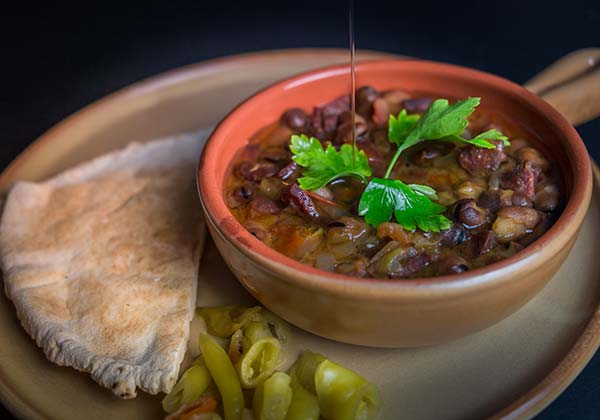
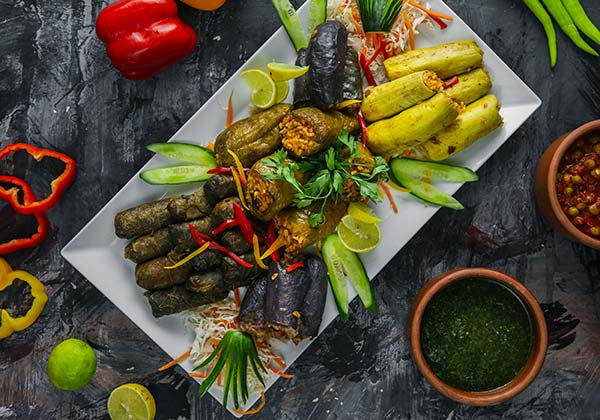
Is Egypt suitable for vegetarians/vegans?
Egypt is largely vegan and vegetarian friendly. Whilst there may not be many cafes and restaurants that describe themselves as vegan, most naturally have a wide range of vegetarian and vegan meals. Be prepared for a feast of numerous delicious meals prepared from vegetables, legumes, and of course spices. Two of our favorites are Ful and Mashi.
Ful, a spicy fava bean stew served with unleavened bread is a national favourite and widely available. A tasty local variation of falafel known as ta’amiya is widely available, made with fava beans instead of chickpeas. Mashi, stuffed grapevine leaves, zucchini or cabbage is similar to Greek Dolma and just as filling. The stuffing is usually spiced rice and chickpeas cooked in a tomato-based sauce and served with lemon. Mezze style meals are common, with lots of little dishes served with bread. Take time to try baba ganoush a hearty eggplant puree with the added flavour of tahini, cumin and lemon.
Regional specialities
As in most countries, Egypt has its regional specialities. Luckily many are served in restaurants and hotels in the major cities. You can try fatta from Nubia, a layered dish of fried beans and rice covered in a tomato, garlic and vinegar sauce. A favourite from Alexandria is sayadeya. This tasty dish is typically made using bass or blue fish and is served with yellow rice and the ubiquitous spiced tomato sauce.
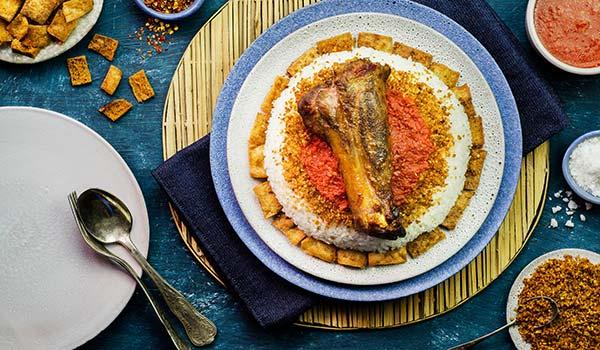
Where to eat in Cairo
On a Budget
- Kazaz Restaurant
(32 Mohammed Roushdy, Al Fawalah, Abdeen, Cairo Governorate) - Zooba
(2nd floor, 114 26 Street, 11211, Egypt) - Gad Restaurants
(125 Azhar St, Cairo 11511)
Won’t Break the Bank
- Bab Al Qasr
(First Settlement, New Cairo, Cairo 1151) - Night & Day
(Semiramis InterContinental, Corniche El Nile, Garden City, Cairo 1151) - Taboula Lebanese Restaurant
(Garden City, Cairo 11511)
Treat Yourself!
- Al Khal Egyptian Restaurant
(El-Darb El-Ahmar, Cairo 11511) - Zitouni
(1089 Corniche El Nil, Qasr El Nil, Cairo 11519) - Bab El Nil Restaurant
(Nile City towers, 2005B Corniche El Nil, Ramlet Beaulac Ramlet، Cairo 11311)
Drinks in Egypt
One of the most well known drinks in Egypt is a hibiscus juice known as karkadeh, which can be served hot or cold. Qasab, is another uniquely Egyptian drink made from sugar cane. Sweet and refreshing it is perfect to revive you after a day out in the desert sun.
If it is cooler outside, or you simply want to treat yourself, sahlab is the drink to try. This sweet warm drink can be flavoured with vanilla, sugar, and cinnamon. It can be found in most cafes and restaurants as well as from many street vendors. Drinking tea is something of a national pastime in Egypt. It is drunk throughout the day usually without milk and with lots of sugar. A refreshing alternative is mint tea. Look for shai bi-na’na (tea is shai and bi-na’na means with mint). A real pick me up on a hot day.
If you cannot live without coffee you may love ahwa, named after the traditional coffee houses where it was served. Syrupy and strong, this coffee is served in espresso sized portions. Whilst Egypt’s Muslim population typically do not consume alcohol, alcoholic drinks are available.
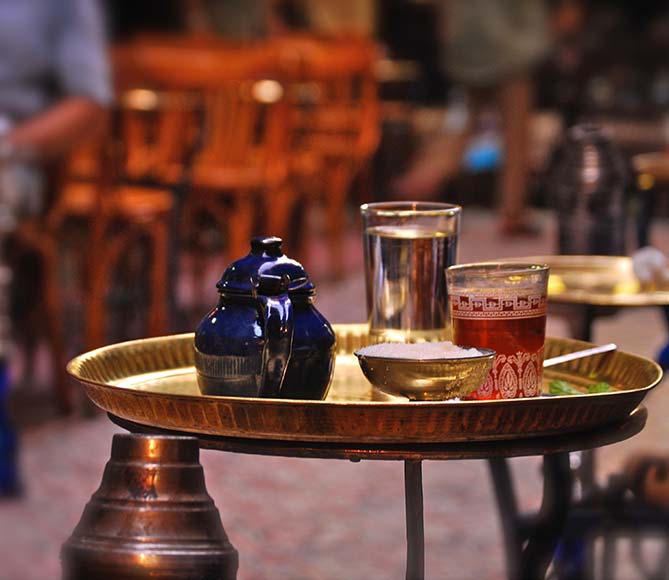
Featured Tours




